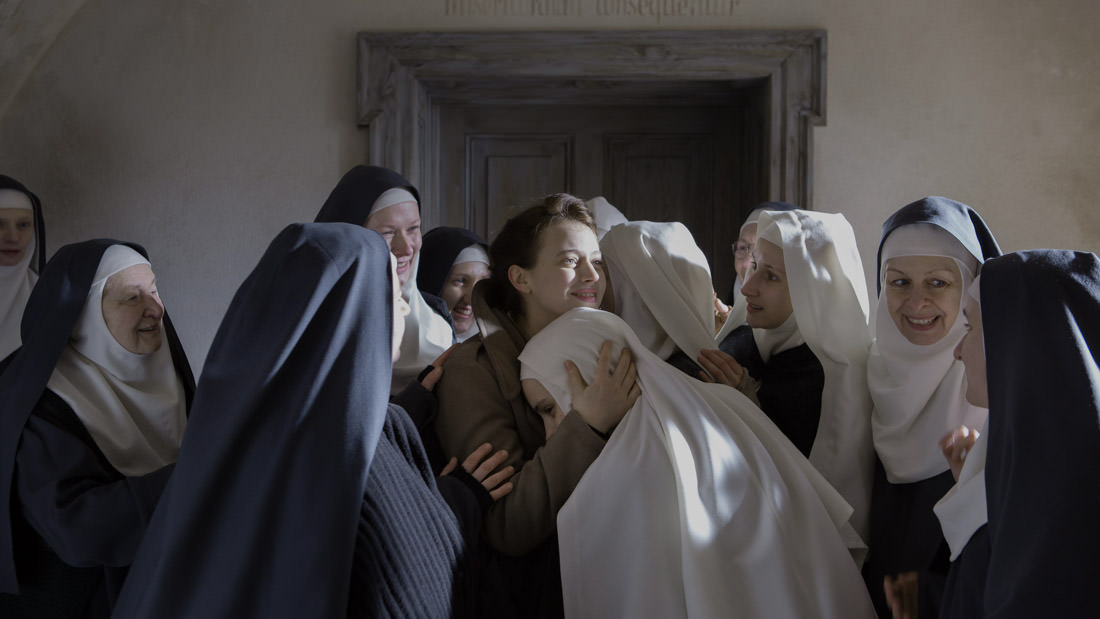It’s getting hard to
find a World War II era story that hasn’t been told and retold again. Kudos are
due to Anne Fontaine for not only finding a tale not often seen, but imbuing it
with a feminine perspective so often erased from wartime narratives. For as
much trauma and violence the women of “Agnus Dei” have witnessed, theirs is a
story of survival and rebuilding from ruins. Theirs is a history worth
remembering.
Months after the end
of WWII, a French Red Cross nurse Mathilde (Lou de Laâge) is approached by a
Polish nun begging for someone to treat someone at her convent. After she
refuses to leave, the nurse decides to drive her back and check the ailing
patient. She discovers the young woman is giving birth and that many of the
sisters are rape survivors from the war hiding their pregnancies in fear that
the Catholic Church would learn of their predicament. Mathilde must make the
decision of whether to covertly treat the women or return to her duties with
retreating French troops.
It’s rare to find a
movie celebrating sisterhood so openly. That sentiment is not just for the nuns
either, but with the communist atheist woman of the world who empathizes with
their plight and helps them. The price of her sacrifice is shown in various ways,
including the trouble she has with her relationship to the doctor she is
seeing, her work at the hospital and the peril of traveling alone with soldiers
still patrolling the streets. That last one in particular is one of the more
harrowing insights to being a woman trying to do the right thing.
Director Anne Fontaine
channels a Bergman touch in her effective use of space between her actors. Characters
in the convent are so carefully placed in front of the camera that it gives a
sense of uneasy stillness and intensity. In one whispered conversation between
the nurse and an elder nun, their faces are almost placed in “Persona”-like
poses. They share the same goal to save the women and deliver their babies, but
they are of two minds of how to accomplish that. When Mathilde is working in
the Red Cross, the camera is as busy as she is, moving from room-to-room and
keeping pace in the hectic space. For most of the movie, the convent is cold,
its colors dour. By the time the film ends in spring, it appears as if almost
everything in the frame has been reupholstered. Gone is the sad darkness;
there’s light shining from almost every face that was once tear-stained.
But composition isn’t
the only striking element of “Agnus Dei.” The film also plays as a mediation on
faith in times of crisis. It’s not so much obsessed with religious dogma, but
of the way religion can be used as a means of comfort. But it’s very possible
to lose one’s faith in dark times and see the tragedy around you as evidence of
the lack of a greater power. The nuns at the convent are in various stages of
coping, from denial to anger, and their struggle to support each other is its
own form of faith in practice. The nuanced depiction of religious life deserves
more exploration, and “Agnus Dei” accomplishes this by contrasting the several
experiences of its characters.
We’ve held up many
wartime heroes from this era, and this unsung heroine deserves to be celebrated
among them. “Agnus Dei” is a song for communion that asks God to take away the
sins of the world and to give parishioners mercy and peace. We see the nuns
pray many times, even the ones questioning their faith hold steadfast to rituals.
They look to move past the terror the war brought, and with the help of a
compassionate outsider, are able to find peace. “Agnus Dei” is a lovely ode to
healing through solidarity.












